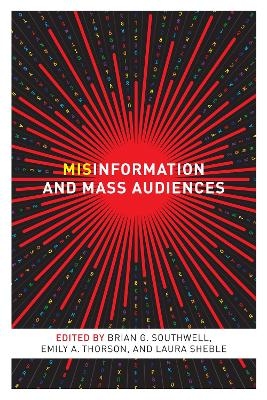
Misinformation and Mass Audiences
University of Texas Press (Verlag)
978-1-4773-1456-2 (ISBN)
Lies and inaccurate information are as old as humanity, but never before have they been so easy to spread. Each moment of every day, the Internet and broadcast media purvey misinformation, either deliberately or accidentally, to a mass audience on subjects ranging from politics to consumer goods to science and medicine, among many others. Because misinformation now has the potential to affect behavior on a massive scale, it is urgently important to understand how it works and what can be done to mitigate its harmful effects.
Misinformation and Mass Audiences brings together evidence and ideas from communication research, public health, psychology, political science, environmental studies, and information science to investigate what constitutes misinformation, how it spreads, and how best to counter it. The expert contributors cover such topics as whether and to what extent audiences consciously notice misinformation, the possibilities for audience deception, the ethics of satire in journalism and public affairs programming, the diffusion of rumors, the role of Internet search behavior, and the evolving efforts to counteract misinformation, such as fact-checking programs. The first comprehensive social science volume exploring the prevalence and consequences of, and remedies for, misinformation as a mass communication phenomenon, Misinformation and Mass Audiences will be a crucial resource for students and faculty researching misinformation, policymakers grappling with questions of regulation and prevention, and anyone concerned about this troubling, yet perhaps unavoidable, dimension of current media systems.
Brian G. Southwell directs the Science in the Public Sphere Program in the Center for Communication Science at RTI International. He is also is a faculty member at Duke University and the University of North Carolina at Chapel Hill. Emily A. Thorson is an assistant professor of political science at Syracuse University. Laura Sheble is an assistant professor in the School of Information Sciences at Wayne State University and an SSRI Visiting Research Fellow at the Duke Network Analysis Center at Duke University.
Acknowledgments
Introduction: Misinformation among Mass Audiences as a Focus for Inquiry (Brian G. Southwell, Emily A. Thorson, and Laura Sheble)
Part I. Dimensions of Audience Awareness of Misinformation
Chapter 1. Believing Things That Are Not True: A Cognitive Science Perspective on Misinformation (Elizabeth J. Marsh and Brenda W. Yang)
Chapter 2. Awareness of Misinformation in Health-Related Advertising: A Narrative Review of the Literature (Vanessa Boudewyns, Brian G. Southwell, Kevin R. Betts, Catherine Slota Gupta, Ryan S. Paquin, Amie C. O’Donoghue, and Natasha Vazquez)
Chapter 3. The Importance of Measuring Knowledge in the Age of Misinformation and Challenges in the Tobacco Domain (Joseph N. Cappella, Yotam Ophir, and Jazmyne Sutton)
Chapter 4. Measuring Perceptions of Shares of Groups (Douglas J. Ahler and Gaurav Sood)
Chapter 5. Dimensions of Visual Misinformation in the Emerging Media Landscape (Jeff Hemsley and Jaime Snyder)
Part II. Theoretical Effects and Consequences of Misinformation
Chapter 6. The Effects of False Information in News Stories (Melanie C. Green and John K. Donahue)
Chapter 7. Can Satire and Irony Constitute Misinformation? (Dannagal G. Young)
Chapter 8. Media and Political Misperceptions (Brian E. Weeks)
Chapter 9. Misinformation and Science: Emergence, Diffusion, and Persistence (Laura Sheble)
Chapter 10. Doing the Wrong Things for the Right Reasons: How Environmental Misinformation Affects Environmental Behavior (Alexander Maki, Amanda R. Carrico, and Michael P. Vandenbergh)
Part III. Solutions and Remedies for Misinformation
Chapter 11. Misinformation and Its Correction: Cognitive Mechanisms and Recommendations for Mass Communication (Briony Swire and Ullrich Ecker)
Chapter 12. How to Counteract Consumer Product Misinformation (Graham Bullock)
Chapter 13. A History of Fact Checking in U.S. Politics and Election Contexts (Shannon Poulsen and Dannagal G. Young)
Chapter 14. Comparing Approaches to Journalistic Fact Checking (Emily A. Thorson)
Chapter 15. The Role of Middle-Level Gatekeepers in the Propagation and Longevity of Misinformation (Jeff Hemsley)
Chapter 16. Encouraging Information Search to Counteract Misinformation: Providing "Balanced" Information about Vaccines (Samantha Kaplan)
Conclusion: An Agenda for Misinformation Research (Emily A. Thorson, Laura Sheble, and Brian G. Southwell)
Contributors
Index
| Erscheinungsdatum | 31.01.2018 |
|---|---|
| Verlagsort | Austin, TX |
| Sprache | englisch |
| Maße | 152 x 229 mm |
| Gewicht | 454 g |
| Themenwelt | Mathematik / Informatik ► Informatik |
| Naturwissenschaften | |
| Sozialwissenschaften ► Kommunikation / Medien | |
| ISBN-10 | 1-4773-1456-3 / 1477314563 |
| ISBN-13 | 978-1-4773-1456-2 / 9781477314562 |
| Zustand | Neuware |
| Haben Sie eine Frage zum Produkt? |
aus dem Bereich


